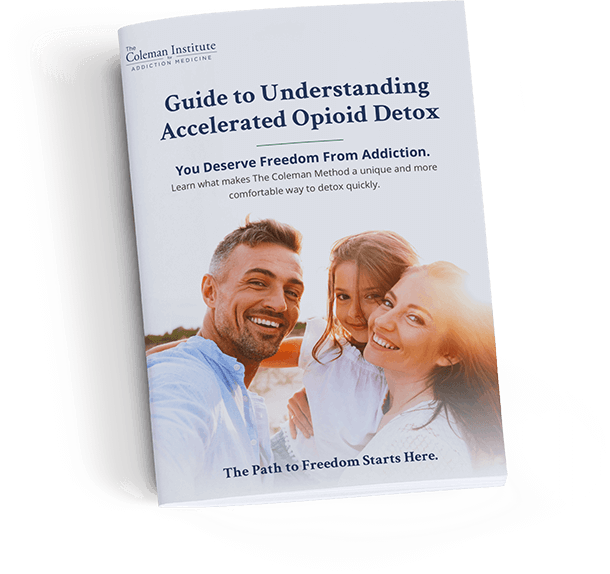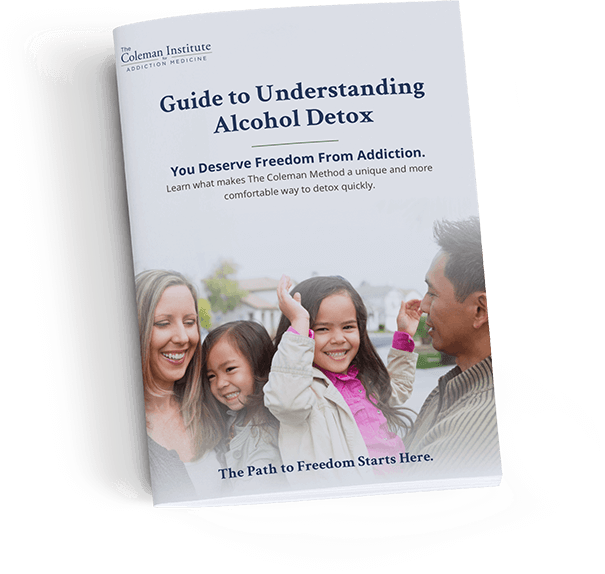
Addiction Resources Center
Ready to break free from addiction and reclaim your life? The Coleman Institute’s Addiction Resources Center can help. Our curated collection of addiction resources provides valuable information for patients and loved ones, from substance-specific insights and treatment options to the science of dependency and addiction. Explore these guides and websites and get the knowledge you need to make informed decisions about detox and recovery.
Explore Opioid & Alcohol Addiction Resources
The Guide to Understanding Accelerated Opioid Detox
Getting through the withdrawal symptoms of opioid use on your own is extremely difficult, since opioids cause physical changes in your brain. Most people cannot stop using opioids without a severe and intolerable withdrawal reaction, and many seek out professional help through medical detoxification. Detoxification (more accurately, withdrawal management) can be the first step on the road to recovery from opioid addiction. Get our free, comprehensive guide to learn about available opioid detox and addiction treatment options.
The Guide to Understanding Alcohol Detox
Detoxing after sustained alcohol use on your own can be scary and uncomfortable, but it also has the potential to be extremely dangerous and even fatal. The persistent use of alcohol changes the brain in powerful ways. If withdrawal is not managed carefully there can be seizures, permanent brain damage, and possibly death. The extent and severity of alcohol withdrawal symptoms are related to the intensity of the individual’s level of dependency. Get our free comprehensive guide to learn about available alcohol detox and addiction treatment options.
The Guide to Understanding Fentanyl Detox
Fentanyl—a powerful synthetic opioid—is a significant contributor to the opioid crisis in the United States. It is readily available on the streets because it is cheap to manufacture and up to 50 times more potent than heroin. In many cases, people do not even realize the drug they are purchasing contains deadly Fentanyl, and addiction can occur after only a few uses. Get our free comprehensive guide to learn more about fentanyl detox and addiction treatment options.
The Guide to Understanding Heroin Detox
Heroin addiction can happen to anyone—roughly one million people reported using heroin in the past year, according to the 2016 National Survey on Drug Use and Health. Most people cannot stop using heroin without a severe withdrawal reaction and must seek out professional help through medical detoxification. Detox can be key to getting your life back from opioid addiction. Get our free comprehensive guide to learn more about heroin detox and addiction treatment options.
The Guide to Understanding Pain Medication Detox
Living with chronic pain can be incredibly difficult. This condition is often made worse by having to manage powerful prescription opiate painkillers, which can create dependency over time and lead to withdrawal symptoms even when taken as prescribed. Detoxing off of pain medication on your own can be extremely challenging, as opioid-based pain medications can cause physical changes in your brain. Get our free comprehensive guide for more information about available pain medication detox and addiction treatment options.
The Guide to Understanding Prescription Drug Detox
When used as directed, prescription opioid medications provide many benefits, including pain relief. Unfortunately, many commonly prescribed medications are also highly addictive. What begins as a simple treatment for a medical condition can lead to a debilitating opioid dependence and could eventually result in addiction. Detoxing off prescription drugs on your own can be extremely difficult, but there is hope. Get our free comprehensive guide to learn about available prescription drug detox and addiction treatment options.
The Guide to Understanding Naltrexone Therapy for Opioids and Alcohol
Detoxing on your own is an extremely dangerous and painful process. Opioids like heroin, morphine, and codeine, as well as pain medications and excessive alcohol consumption, can have a dramatic physical impact on a patient’s brain. Most people cannot stop taking these substances without a severe withdrawal experience, and many require expert professional care while detoxing. Naltrexone Therapy is an effective way to mitigate withdrawal symptoms and provide critical assistance during opioid and alcohol detox. Learn more with this comprehensive guide to detoxing using Naltrexone Therapy.
The Guide to Detoxing Off Suboxone
Suboxone (buprenorphine/naloxone) can help people stop using and purchasing street drugs, but buprenorphine itself is an opioid. For patients who are stable on Suboxone, there is no reason to stop taking it. For people who are ready to detox off Suboxone, this comprehensive guide can help explain their options.
The Guide to Detoxing Off Methadone
Many people have successfully used methadone in order to stop using heroin, fentanyl, or other dangerous opioids and have begun to recover their normal lives. One complication is that methadone is also a mood-altering opioid that is incredibly addictive. Detoxing off methadone can even be harder than heroin and many prescription opiates, but it is possible. Get our free comprehensive guide to learn more.
National Institute on Drug Abuse
The National Institute on Drug Abuse’s mission is to “advance science on drug use and addiction and to apply that knowledge to improve individual and public health.” With ample research initiatives, tools, articles and more, the National Institute on Drug Abuse is paving the way for scientific research on drug use and addiction.
Substance Abuse and Mental Health Services Administration (SAMHSA)
The Substance Abuse and Mental Health Services Administration (SAMHSA), part of the U.S. Department of Health and Human Services, was established to “make substance use and mental disorder information, services, and research more accessible.” Their vision is to help ensure that those at risk for mental health and substance use conditions have equitable access to care.
DrugFree.org
DrugFree.org is an organization dedicated to the prevention, early action, and treatment of addiction that seeks to help individuals with recovery. They also empower families and shape public policy as it relates to Substance Use Disorder.
National Institutes of Health (NIH)
As part of the U.S. Department of Health and Human Services, the National Institutes of Health (NIH) medical research agency for the United States. Their goal is to apply learnings from research into living systems and apply them toward improving human life.
Just Think Twice
Just Think Twice is a joint effort between the United States Government and the Drug Enforcement Administration (DEA) that seeks to educate the public on the dangers of drugs by sharing studies, research, and articles related to drug use and addiction.



